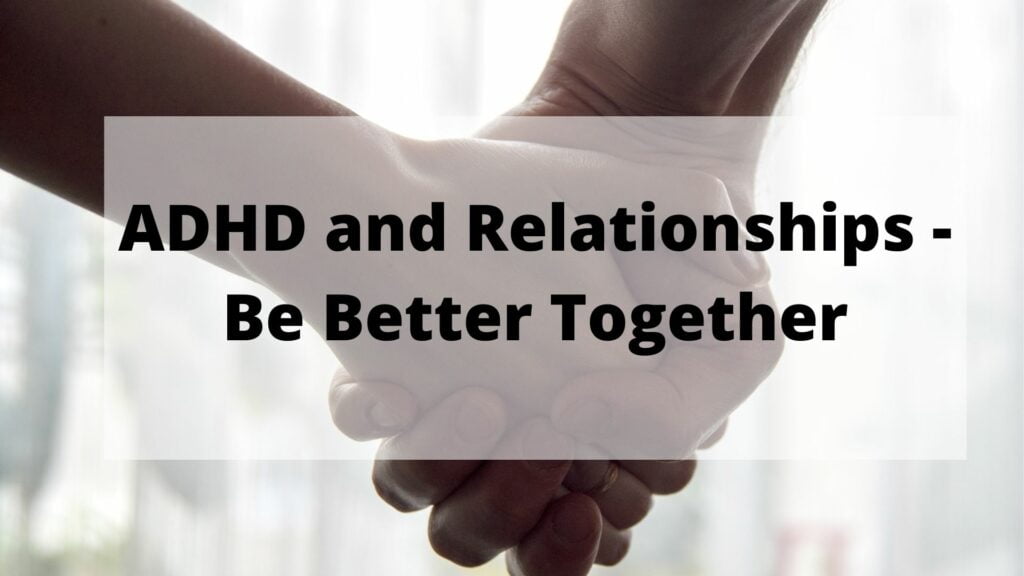Many people with Adult ADHD have a hard time in relationships. They may find it difficult to convey their demands, become easily distracted by daily work, and say no to other activities. In this post, we’ll look at some of the most common relationship issues that people with Adult ADHD face, as well as how they can overcome these obstacles to improve their relationships.
Attention deficit hyperactivity disorder that isn’t treated properly (ADHD). In your closest relationships, this can lead to misunderstandings, frustrations, and ill will. There are, nevertheless, strategies for improving a relationship.
Contents
- 1 What Is ADHD?
- 2 How ADHD Affects Relationships
- 3 Symptoms of ADHD
- 4 ADHD and Relationships
- 5 Possible Benefits of ADHD In Relationships
- 6 The Downside of ADHD And Relationships
- 7 ADHD and Marriage
- 8 Why Breakups Happen?
- 9 Some Help to Maintain A Relationship
- 10 Tips to Maintain A Healthy Relationship
- 11 Conclusion
What Is ADHD?
“Attention Deficit Hyperactivity Disorder (ADHD) is a mental disorder that affects approximately 400 million people worldwide. ADHD was first used to characterize children who were hyperactive, unable to focus during school-age activities, and had trouble learning using traditional methods in the 1970s.”
As a result, your companion may experience attention problems and excessive conduct. This neurodevelopmental condition is chronic, meaning that it affects people for the remainder of their lives.
The majority of people struggle with the following:
- Concentration
- Misplaced motivation
- Organizational difficulties
- Self-discipline
- Time management
Furious or violent rages may be displayed by the ADHD partner. Occasionally, terrible fights break out, causing trauma to spouses and children. Although these furious outbursts may vanish as quickly as they arise, the nasty statements spoken in the rush of the moment may worsen family tensions.
How ADHD Affects Relationships

While distractibility, disorientation, and impulsiveness are common symptoms of attention deficit hyperactivity disorder (ADHD or ADD), it can have a significant impact on many facets of adult life. When these symptoms are not adequately diagnosed or treated, they can be especially harmful to intimate relationships.
Symptoms of ADHD
- Trouble paying attention – If your partner has ADHD, you may find yourself drifting off during talks, making them feel ignored and unimportant. You might also forget important facts or agree to something without realizing it afterward, which can be frustrating for your loved one.
- Forgetfulness – When someone with ADHD is focusing attentively, still they may forget what was said or agreed upon afterward. When it’s your spouse’s birthday or the recipe you promised to purchase, your partner can think you don’t care or are untrustworthy.
- Poor organizational skills -This might make it difficult to complete duties as well as create general disarray in the home. Partners may feel like they’re always cleaning up after the ADHD person and doing an excessive quantity of household duties.
- Impulsivity -You could say things without thinking, which might harm the sentiments of those with ADHD. Impulsivity can lead to unwise and even reckless behavior (for example, spending money on something that wasn’t planned for, resulting in financial disputes).
- Emotional outbursts– Many persons with ADHD struggle to maintain emotional control. You are prone to losing your temper on a regular basis, and sensible discussion of problems may be difficult for you. Your partner may feel as if they must walk on eggshells in order to avoid a breakdown.
ADHD and Relationships
How The Partner With ADHD Often Feels?
- Different –The brain is frequently in a race, and individuals with ADHD perceive the world in a way that others don’t comprehend or relate to.
- Overwhelmed –Stress, whether it’s openly or privately caused by ADHD symptoms, can cause major damage to your health. Keeping daily life under control is far more difficult than most people realize. Even if it isn’t always apparent, having ADHD might make someone feel as if they’re struggling to keep their head above water.
- Subordinate to their spouses –They’re often too controlling, which is a turnoff for dating partners who wish to be equal. They may end up with someone else running the show because their significant others are so busy correcting them or running things. According to them, these situations make men feel emasculated.
- Shamed- They frequently conceal a significant quantity of guilt, sometimes replacing it with bluster or flight.
- Unloved and unwanted – Constant reminders from spouses, bosses, and others that they should “improve themselves” imply that they are unwanted just as they are.
- Afraid to fail again – As their relationships deteriorate, the potential for punishment grows. However, because of ADHD’s disorganization, this partner will ultimately fail. In anticipation of failure, people avoid putting themselves out there.
- Longing to be accepted – Acceptance and affection for who they are, despite their flaws, is one of the most huge emotional desires of people with ADHD.
How The Non-ADHD Partner Often Feels?
- Unwanted or unloved –Rather than being distracted, a lack of attention is viewed as a lack of interest. One of the most common wishes is to be “cherished,” which refers to receiving attention from one’s spouse.
- Angry and emotional blocks – Many relationships with the ADHD spouse are in marriage by irritation and bitterness. At other times, this rage is in manifestation as disaffection. To avoid having angry discussions, some non-ADHD spouses attempt to suppress their sentiments by locking them away inside of them.
- Incredibly stressed out – Non-ADHD partners are usually set to meet the majority of family needs, which makes it difficult for them to relax. Because of the ADHD partner’s unpredictability, life can fall apart at any time.
- Ignorance and offense -It doesn’t make sense to a non-ADHD spouse that the ADHD one doesn’t take action on the non-ADHD partner’s recommendations and experience more often when it’s “obvious” what needs to be done.
- Exhaustion and depletion- The non-ADHD spouse is overwhelmed with duties and no amount of effort seems to improve the relationship.
- Frustrated -A spouse who does not have ADHD may notice that the same concerns keep recurring (a boomerang effect).
Possible Benefits of ADHD In Relationships
ADHD patients show a number of features that are common in other people. The following features were found in one study:
- Positivity: Those with ADHD have a more positive view, which can help them cope with the obstacles of any relationship.
- Sociability: People with ADHD tend to be chatty and gregarious, and participants in the study indicated that being talkative and sociable helped them create and strengthen relationships.
- Openness: People with ADHD are more likely to be friendly, which means they are more inclined to talk about topics that others might avoid or miss.
- Empathy: People with ADHD may be more willing to help and think about problems from a different perspective.
- Resilience: If a person is actively attempting to overcome the issues associated with ADHD, he or she may become more robust. When it comes to relationships, someone with ADHD may stick around even though others have given up or developed other coping techniques.
People with ADHD can enjoy long-term, mutually productive relationships, according to the Attention Deficit Disorder Association.
The Downside of ADHD And Relationships

If you have ADHD, you may feel that you’re constantly being punished, nagged, and micromanaged. Whatever you do, nothing seems to satisfy your spouse or lover. Because you don’t feel appreciated as an adult, you avoid your partner or say anything to put an end to their whining. You wish your significant other would relax a little and quit attempting to control every area of your life. You’re wondering where the person you fell in love with has gone.
You may feel lonely, unappreciated, and forgotten if you’re in a relationship with someone who has ADHD. You’re tired of being the solely responsible member in the relationship and having to handle everything on your own. You don’t think you can put your trust in your partner. They never seem to keep their commitments, so you’re forced to nag or do things on your own. It can feel as if your spouse is careless at times.
It’s easy to see how both parties’ feelings could contribute to a relationship’s vicious cycle. While the non-ADHD partner rails, nags, and becomes irritated, the ADHD partner feels judged and misunderstood, becomes defensive, and withdraws. Everyone is unsatisfied in the end. This does not have to be the case all of the time.
ADHD and Marriage

Many couples say that having ADHD in their marriage has put a strain on their relationship. As time goes on, the spouse who does not have ADHD discovers that he or she must shoulder much of the burden:
- Parenting
- Financial responsibility
- Home management
- Resolving family problems
- Household chores
If you’re an ADHD partner, it’s easy to feel like a parent rather than a spouse. The sexual relationship is affected if the marriage becomes a parental dynamic. The non-ADHD partner may interpret their partner’s behavior as a symptom of abandonment. This type of situation could lead to a divorce.
If your spouse has ADHD, it’s important to show empathy. When things get tough, take a breath and recall the reasons you fell in love. These little reminders may help you get through some of the most difficult days. If you believe you can’t handle it any longer, marriage counseling could be helpful.
Why Breakups Happen?
Sometimes, the breakup comes as a complete surprise to the partner with ADHD, who was too preoccupied to notice that the relationship was breaking down. The partner with ADHD may have withdrawn mentally and emotionally in good feeling overwhelmed by housework or demanding children, leaving the other partner feeling abandoned and indignant.
The differences between two people with ADHD who are in a relationship might cause tension and conflict. These tensions and conflicts might be worsened if one of the couples has not been diagnosed and has thus left the situation alone. Treatment, on the other hand, may not always be sufficient to reduce rage and bitterness. The longer conflicts in a relationship go unanswered, the more probable it is that the relationship will fall apart.
Some Help to Maintain A Relationship
Learning about the role ADHD plays in your relationship and how you can work together to respond to challenges and communicate with one another more positively and constructively will help you create a more healthy and happy relationship. These techniques can help you better understand your relationship and bring you closer together.
Their capacity to lavish their spouse with affection and attention, as well as the high quality of ADHD hype focus, may mask these problems.
Hype focus, on the other hand, is accompanied by fast shifts. When this occurs, someone with ADHD may appear to be oblivious to their partner. This may lead the ignored partner to wonder if they are actually loved. This pattern has the potential to destroy a relationship. The ADHD partner may constantly question their spouse’s love or devotion, which can be interpreted as a lack of trust. This may cause the relationship to drift apart.
Tips to Maintain A Healthy Relationship
Here are some ideas on how to keep your relationship healthy:
Consider Couples Therapy

If you or your spouse have ADHD, you might be thinking that there is something wrong with you. You may believe that if only someone changed their way of thinking or acting, everything would return to normal. But blaming one another for the negative effects of ADHD won’t help things get any better. These side effects can include:
- Diminished sex life
- Messy house
- Financial struggles
At the very least, the ADHD partner should be treated with medication and counseling. Couples therapy with a trained ADHD specialist can provide further support for both partners and assist them in returning to productive, honest communication. Couples who manage their illness together may be able to restore their bonds and take on better responsibilities in their relationship.
See Things From Other Person’s Point Of View
When a partner feels neglected, ignored, and unappreciated, they may have arguments. By remaining neutral and taking a step back, it is possible to maintain perspective.
Some strategies include:
- Asking the other person how they are feeling and listening to what they say
- Not interrupting
- While the other person is speaking, don’t try to defend any actions.
- When the person has finished, repeat their main points back to them to check to understand
It may be helpful to write down the major points of discussion and reflect on them later.
Get a Diagnosis
When people with ADHD are unaware of their condition, it can have a negative impact on their relationships. Only 10% of those with symptoms of ADHD have received a diagnosis.
A diagnosis might be the first step in obtaining treatment and learning useful management techniques.
Communicate
Communicate face to face whenever possible. Signs like eye contact, voice tone, and gestures convey far more information than words alone. Use in-person talks rather than phone chats or text messaging to find out the emotion behind the words instead of contacting or texting your partner.
Listen actively and don’t interrupt. Maintain eye contact while the other person is speaking. If your attention wanders, repeat their words in your head to keep track of the discussion. Make an effort to avoid interjecting if at all possible.
Ask questions. Instead of immediately starting whatever it is you’d like to talk about—or the numerous things you want to discuss—ask them a question. They’ll know you’re listening if you do this.
Request a repeat. If you become distracted, inform the other person and ask them to repeat what they just said. It will be more difficult to reconnect if your attention is diverted during the debate.
Manage Your Emotions

Consider practising mindfulness meditation if you can’t talk about certain issues without losing your temper or saying things you later regret. Regular mindfulness meditation might help you gain greater emotional control and avoid the emotional outbursts that may be so harmful in a relationship.
Work Together As A Team
You can have a good, equally enjoyable relationship even if one of you has ADHD. The secret is to learn to work as a team. A good relationship entails give and take, with both individuals putting effort into the marriage while also searching for methods to assist each other.
Take some time on both sides to figure out what you’re good at and which activities are the most difficult for you. Perhaps your spouse can take over that duty if you’re strong in an area where they’re weak, or vice versa. It should feel like a fair trade-off. If neither of you is very good with money, consider hiring a bookkeeper or looking into budget programs.
- Divide tasks and stick to them. The non-ADHD partner may be designed to overcome the bills and conduct errands, leaving you to look after the kids and cook.
- Schedule weekly sit-downs. At the beginning of your relationship, schedule a weekly meeting to discuss concerns and evaluate your progress as a couple.
- Evaluate the division of labor. Make a list of chores and duties, and then equalize the workload if one of you or both of you is carrying too much.
- Delegate, outsource, and automate. Your partner and you do not have to accomplish everything on your own. If you have children, assign them tasks. You might also want to explore ordering groceries online or setting up automatic bill payments.
If required, break down specific tasks. If the ADHD partner has problems completing projects, the non-ADHD partner may need to step in. This should be considered when drafting your agreement to minimize mistakes.
Help Your Partner With ADHD
To help your partner with ADHD –
- Develop a routine. You’ll both benefit from the additional structure. Make a plan for the tasks you need to do and set aside times for meals, exercise, and rest.
- Set up external reminders. A dry erase board, sticky notes, or a phone-based to-do list are all viable options.
- Control clutter. Clutter contributes to the sense that one’s life is out of control, which is especially stressful for individuals with ADHD. Assist your spouse in creating a method for dealing with clutter and remaining organized.
- Ask the ADHD partner to repeat requests. Ask your partner to repeat what you’ve agreed on to avoid any misunderstandings.
Conclusion
ADHD is a disorder that can affect relationships. If you are struggling with ADHD, don’t give up hope on your relationship! There are many strategies for managing this disorder and improving the quality of life in general. Make sure to work closely with your doctor or therapist to identify the right treatment plan for you. They will be able to help guide you through these difficult times by offering advice about how best to deal with day-to-day challenges related to living with ADHD as well as tips for maintaining healthy romantic relationships. Remember that there is always light at the end of the tunnel; it just may take some time to find it!
For more information, please contact MantraCare. ADHD is a neurodevelopmental disorder characterized by difficulty in paying attention, hyperactivity, and impulsivity. If you have any queries regarding Online ADHD Counseling experienced therapists at MantraCare can help: Book a trial ADHD therapy session


